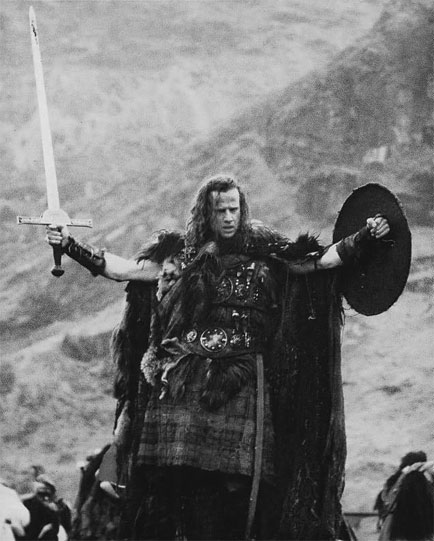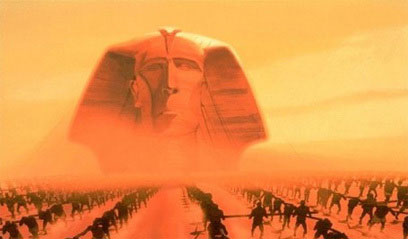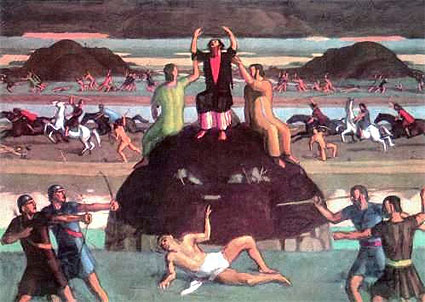Feb
11
2010
 God took on a body, from the dust, in Adam. A trillion particles of inanimate, dead stuff pulled together and organised into the most complex system in the cosmos, an organic machine capable of feats we are yet to discover.
God took on a body, from the dust, in Adam. A trillion particles of inanimate, dead stuff pulled together and organised into the most complex system in the cosmos, an organic machine capable of feats we are yet to discover.
Adam, as Covenant head, also took on a “body.” A Divine Handful of flesh and bone, dead or dying by any human measure, organised into a being more palatial and lavish than any male eye is worthy to behold.
Continue reading
3 comments | tags: Abraham, David, Film, goliath, Herod, Nimrod, Satan, The flood, Totus Christus, Totus Diabolus | posted in Biblical Theology, The Last Days, Totus Christus
Jan
18
2010

or The Sick Fix of Quick Bricks
God had repeated His promises of land and people to Isaac, but it was to Jacob that God revealed He was going to build the true Babelic tower in the Promised Land. With his head on a rough stone, Jacob saw angels ascending and descending on a stairway to heaven, a ziggurat, a constructed holy mountain, between God and man. As with Eve, the Lord would build it out of flesh and blood—Jacob’s offspring—a living Tabernacle made of precious stones mined from the Land.
Continue reading
Comments Off | tags: Babel, Compromise, Daniel, Genesis, Jacob, Nimrod, Pharaoh, Tabernacles, Temple | posted in Biblical Theology
May
2
2009
Peter Leithart writes:
Reflections on a class discussion earlier today about place, our connection to the ground, and gnosticism.
- Blood and soil are “powers” that can and have dominated human life, and caused lots of human misery.
- Jesus overcomes those powers. We are identified by water and feast, not by blood or color or place.
- YET (here’s where my thought is undeveloped): Jesus doesn’t just overcome and send the powers packing. He pacifies and reconciles powers; He turns them to the purposes of His kingdom (Col 1-2).
The dilemma: How to express the reconciliation of blood and soil without falling back into the old creation, and without going fascist? How to express Jesus’ pacification of “blood” without letting it usurp the place of the water, and how to express Jesus’ pacification of “soil” without letting it usurp the place of the feast?
Continue reading
Comments Off | tags: Atonement, Canaan, Communion, Compromise, Gnosticism, Herod, High Priest, Holy Place, Most Holy Place, nationalism, Nazirite, New earth, Nimrod, Peter Leithart, Worship | posted in Biblical Theology
Apr
18
2009
or A Marriage Made in…
The Bible is big on mediators. Adam’s role as faithful Showbread would link heaven and earth. He would be a god-man. Fulfilled by Christ, this is the liturgical role of a minister. He faces God as representative of the Bride, and faces the church as the representative of the Bridegroom. He is Solomon at the completion of the Temple dedication.
The ‘hell’ hybrids are the Land-beasts of the Bible. This is what Adam became, conspiring with Satan. It was an unholy alliance between God’s mediator and the Creation, in which the Creation called the agenda. The resulting peoples are hunters like Nimrod and Esau, wolves instead of shepherds, bloodthirsty children of the daughters of men.
Continue reading
Comments Off | tags: 666, AD70, Adam, Boaz, Compromise, Crystal Sea, Dominion Theology, Esther, Herod, Intermarriage, Joseph, Nero, Nimrod, Paul, Pilate, Revelation, Solomon, Table of Showbread, Temple, Totus Christus, Wormwood | posted in Biblical Theology, The Last Days
Apr
10
2009
Attack from the Abyss

As with most things in the Bible the pattern begins in Genesis.
Unlike the serpent’s warriors, who live by the sword, God’s warrior is a father-ruler who fights only to protect those in his care. Nimrod was a serpent-king—a dragon; Abram was a servant-king, God’s answer to Nimrod the ‘rebel’ (most likely Gilgamesh).
Satan’s attack on ‘the offspring of the woman’ through Pharaoh had failed, so he resorted to inciting a conspiracy of nations. The serpent became a dragon. But Abram (as a good Gilgamesh/Nimrod), along with the men of his household, defeated them, rescued Lot and his family, and very importantly, plundered the attackers. The darkest nights that God allows are always opportunities for more glory. And, this being HOLY war, Abram refused the ‘devoted’ plunder.
The next instance involves Amalek, who attacked Israel in the wilderness, and mercilessly picked off the stragglers. Once again, God’s man “came down” to fight – in Joshua, at Moses’ command – with Moses, Hur and Aaron as Ark and cherubim on the holy hill, the “garden gate”.
“The Lord will have war with Amalek from generation to generation.” (Exodus 17:16)
This statement about Amalek is more loaded than it seems. Amalek was defeated, and the plunders from the victory were devoted to building God’s house in the wilderness. We will see this pattern again and again. Each time, deliverance for God’s people is on a greater scale, and the defeat more catastrophic for His enemies.
Comments Off | tags: Aaron, Abraham, Amalek, Genesis, Holy war, Moses, Nimrod, Pharaoh, Tabernacle | posted in Against Hyperpreterism, Biblical Theology, The Last Days, Totus Christus
 God took on a body, from the dust, in Adam. A trillion particles of inanimate, dead stuff pulled together and organised into the most complex system in the cosmos, an organic machine capable of feats we are yet to discover.
God took on a body, from the dust, in Adam. A trillion particles of inanimate, dead stuff pulled together and organised into the most complex system in the cosmos, an organic machine capable of feats we are yet to discover.


























